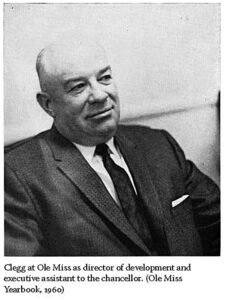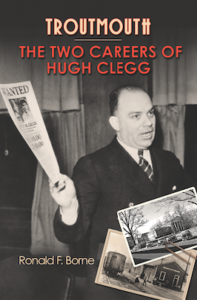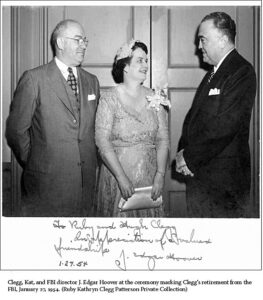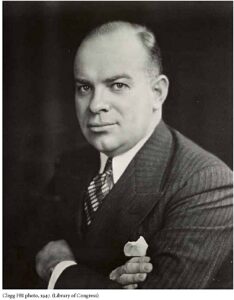Former University of Mississippi professor and administrator Ronald Borne recently released a new book about the remarkable story of a top man at Hoover’s FBI and at Ole Miss before and during the civil rights era.
 Hugh Clegg (1898-1979) was among the most notable Mississippi historical figures during the 1920s through the 1960s. Born in Mathiston, Mississippi, he was a member of the Federal Bureau of Investigation from 1926 to 1954, during which time he rose to the top leadership and worked directly under Director J. Edgar Hoover and Associate Director Clyde Tolson. In his second career, as executive assistant to Chancellor J. D. Williams at the University of Mississippi from 1954 to 1969, he was in a top leadership position before and during the civil rights crises in the State of Mississippi and at Ole Miss.
Hugh Clegg (1898-1979) was among the most notable Mississippi historical figures during the 1920s through the 1960s. Born in Mathiston, Mississippi, he was a member of the Federal Bureau of Investigation from 1926 to 1954, during which time he rose to the top leadership and worked directly under Director J. Edgar Hoover and Associate Director Clyde Tolson. In his second career, as executive assistant to Chancellor J. D. Williams at the University of Mississippi from 1954 to 1969, he was in a top leadership position before and during the civil rights crises in the State of Mississippi and at Ole Miss.
Below is an excerpt of the book, Troutmouth: The Two Careers of Hugh Clegg.
The highlight of Clegg’s involvement in the FBI’s War on Crime was his role in the search for John Dillinger, a role that merits thorough discussion. There have been several erroneous depictions of Clegg’s participation in the hunt for Dillinger. For example, the movie Public Enemies (1959) spotlights agent Melvin Purvis as being solely in charge of the FBI raid at the Little Bohemia Lodge.1 In fact, however, the raid was coordinated by both Purvis and Clegg, and Clegg was the agent in charge.2 And despite some reports to the contrary, Clegg was not involved in the killing of Dillinger outside the Biograph Theater in Chicago. The botched raid at the Little Bohemia Lodge represented the darkest incident in Clegg’s tenure with the Bureau.
 The most famous criminals of the 1930s were Al Capone and John Dillinger. While Capone was feared, Dillinger, who was named by the FBI as America’s first Public Enemy No. 1, was considered by the American public to be a Robin Hood and was thus, despite his criminal activities, a public idol. Several movies and numerous books recounting Dillinger’s life and exploits have appeared, further enhancing his notoriety.
The most famous criminals of the 1930s were Al Capone and John Dillinger. While Capone was feared, Dillinger, who was named by the FBI as America’s first Public Enemy No. 1, was considered by the American public to be a Robin Hood and was thus, despite his criminal activities, a public idol. Several movies and numerous books recounting Dillinger’s life and exploits have appeared, further enhancing his notoriety.
Dillinger was born in Indianapolis, Indiana, in 1903 to middle-class parents. His mother died when he was three years old and he drifted into a life of crime at an early age, leading a neighborhood gang at the age of sixteen. He soon joined the US Navy but went AWOL and was dishonorably discharged. Dillinger was first convicted of a felony in 1924, when he robbed and assaulted a local grocery store owner and was sentenced to a prison term of from two to fourteen years in the Indiana Pendleton Reformatory. He developed his talents at escape, attempting twice in his first few weeks at Pendleton to make a break.3 Embittered with his situation, he established friendships with several hardened criminals, including Harry Pierpont and Homer Van Meter, and developed a more hardened criminal mindset. Five years into his sentence Pierpont and Van Meter were transferred to the Indiana State Prison at Michigan City. In 1929, Dillinger’s wish to be transferred with them was granted, and his relationship with the two was firmed up. Dillinger was paroled in April 1933 and his life as a bank robber started soon thereafter.
 During the Great Depression, banks were not popular among ordinary Americans because of the role they played in foreclosures on homes and farms. In 1934, a movie company featured the manhunt for Dillinger and audiences cheered when his photo flashed on the screen, despite the fact that he had shot and killed a police officer while robbing a bank in East Chicago. He was captured and jailed in the Crown Point prison in Indiana but escaped, stole a car, and drove back to Chicago. The FBI was able to enter the investigation because driving a stolen automobile across state lines had become a federal crime.
During the Great Depression, banks were not popular among ordinary Americans because of the role they played in foreclosures on homes and farms. In 1934, a movie company featured the manhunt for Dillinger and audiences cheered when his photo flashed on the screen, despite the fact that he had shot and killed a police officer while robbing a bank in East Chicago. He was captured and jailed in the Crown Point prison in Indiana but escaped, stole a car, and drove back to Chicago. The FBI was able to enter the investigation because driving a stolen automobile across state lines had become a federal crime.
The popularity of criminals, bank robbers in particular, infuriated Hoover. He was determined to bring Dillinger, Baby Face Nelson, Bonnie Parker and Clyde Barrow, Pretty Boy Floyd, Machine Gun Kelly, and others to justice. Dillinger was such a popular bank robber he was even photographed with his arms around law enforcement officials who eagerly posed with him. There was a need to turn around public opinion about crime, especially among the youth of the country, and the FBI was determined to do just that. But Dillinger was shrewd and proved hard to capture, and when he was captured, he escaped custody. The FBI was criticized for its failure to stop the Dillinger gang, and the criticism reached new heights with the shooting of Eddie Green, a member of the Dillinger gang.
 In April 1934, Dillinger and his gang, which now included Baby Face Nelson, hid out at the Little Bohemia Lodge in Manitowish, Wisconsin, where they were tracked down. Clegg and Melvin Purvis assembled a number of agents and raided the Lodge. The raid turned out to be an embarrassment for the agency when both Dillinger and Nelson made their getaway. FBI agent W. Carter Baum was shot dead by Nelson, the fifth agent to be killed in the line of duty. In addition to the embarrassment, the raid at the Little Bohemia Lodge became a major point of controversy.
In April 1934, Dillinger and his gang, which now included Baby Face Nelson, hid out at the Little Bohemia Lodge in Manitowish, Wisconsin, where they were tracked down. Clegg and Melvin Purvis assembled a number of agents and raided the Lodge. The raid turned out to be an embarrassment for the agency when both Dillinger and Nelson made their getaway. FBI agent W. Carter Baum was shot dead by Nelson, the fifth agent to be killed in the line of duty. In addition to the embarrassment, the raid at the Little Bohemia Lodge became a major point of controversy.
The events that led to the Little Bohemia raid are almost as interesting as the raid itself. Eddie Green, a former member of the Barker-Karpis gang, had become disenchanted with it and joined the Dillinger gang in early 1934. Known as a “jug marker,” Green was adept at casing vulnerable banks to rob, thus endearing himself to Dillinger.

